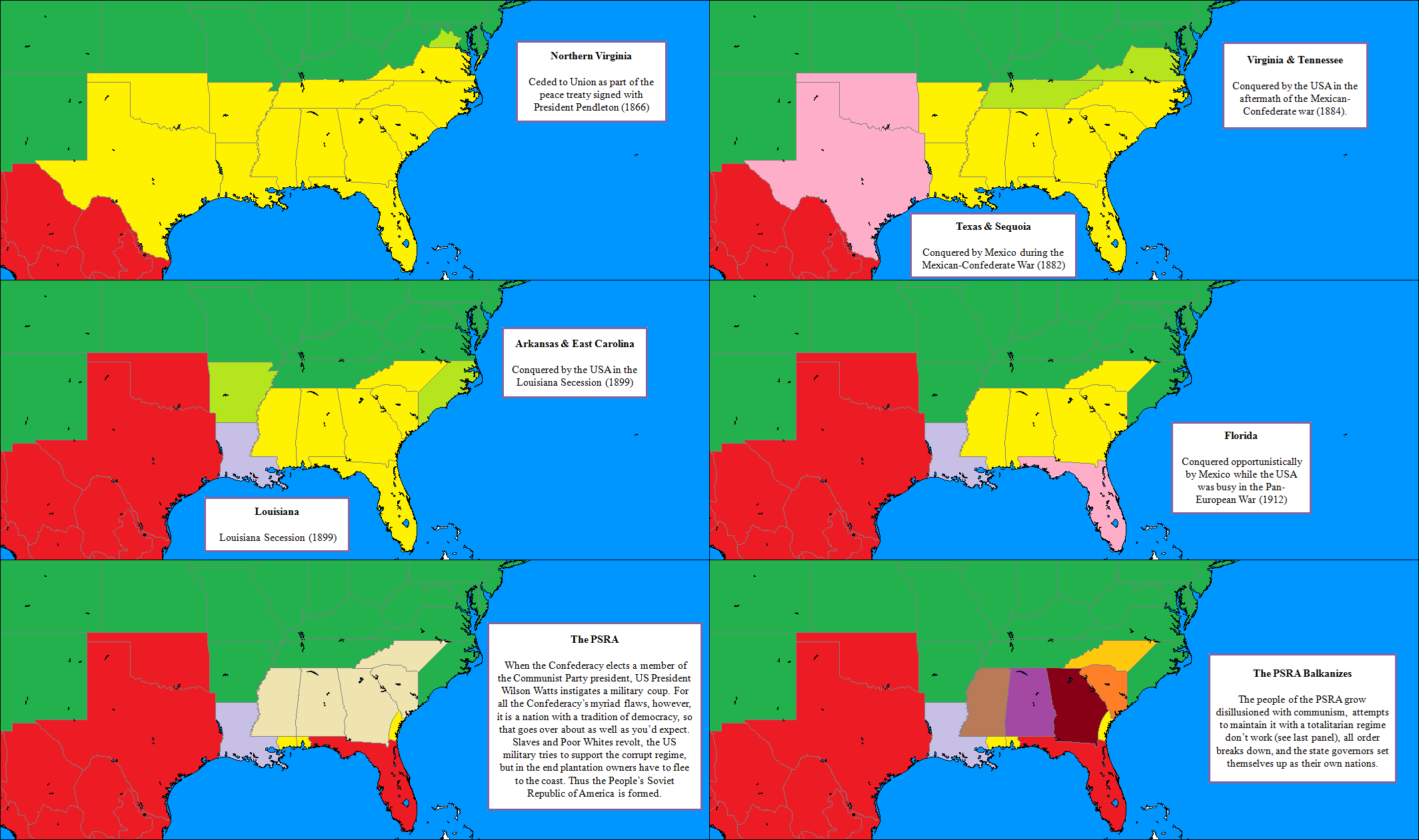May 1864 Hood doesn't back-stab Johnston and attacks as ordered. Sherman forced back.
Sept 1864 Sherman finally reaches Atlanta as he had to take much more time getting there than OTL.
Nov 1864 Little Mac elected Sherman takes Atlanta 3 days after election
Feb 1865 Little Mac sworn in
Apr 1865 Due to presidential interference the Union Army is being forced back
June 1865 President McClellan assassinated President Pendleton assumes office
July 1865 Cease-fire with CSA negotiations begin
Jan 1866 Peace treaty signed
The CSA is made up of Texas, Louisiana, Mississippi, Alabama, Georgia, Florida, SC, NC and Va south of Rappahannock and WV remains a Union state. Free trade with the US.
Inflation rate down to 400% a year
Apr 1866 CSA partially defaults on loans. Loans are rewritten to extend their repayment schedule by a factor of 2 and 2 percentage points less interest. Inflation soars to
1500% a year
May 1866 Most of the CSA army goes home. CSA army goes down to a peacetime strength of 60,000 infantry and 15,000 cavalry. Wartime price controls on railroad rates are lifted.
Inflation goes to 2000% a year. Fugitive slaves go north at 5,000 people a month.
Aug 1866 First peacetime crop harvested. Although it falls well short of that of 1859 it is the best crop since then. Inflation falls to 1000% a year.
Nov 1866 Joesph E Johnston elected president.P. G. T. Beauregard elected vice president.
Feb 1867 Joesph Johnston sworn in as president. Food riots break out in Charleston and Atlanta. Even though the CSA has had its best crop since 1859 it is still far short of
that and rail rates are very high as the railroad companies have to pay off their debt while rebuilding the rails.
Apr 1868 Tighter borders and less fugitives roaming around the countryside drops the number of fugitive slaves going north to 2,000 a month. Still, 32,000 slaves escaped in the
last year. Slave prices start going up from their very depressed levels. Worse for the CSA 75,000 small farmers have been bought out by plantation owners in the last year.
Unemployment soars.
1870 strikes break out all over the south as poor whites keep falling further and further behind with some winding up as virtual debt slaves
1882-1890 riots break out all over the South as slaves start replacing poor whites in factories
1891 - 1892 To distract the Poor Whites the CSA starts a war with Mexico hoping to rally the country around the flag. Unfortunately the Mexican Army quietly receives arms and
ammunition from the USA.
1893- 1895 The reconquest of the CSA by the USA. Many Poor Whites see the old CSA as disastrous for them and refused to fight.
Sept 1864 Sherman finally reaches Atlanta as he had to take much more time getting there than OTL.
Nov 1864 Little Mac elected Sherman takes Atlanta 3 days after election
Feb 1865 Little Mac sworn in
Apr 1865 Due to presidential interference the Union Army is being forced back
June 1865 President McClellan assassinated President Pendleton assumes office
July 1865 Cease-fire with CSA negotiations begin
Jan 1866 Peace treaty signed
The CSA is made up of Texas, Louisiana, Mississippi, Alabama, Georgia, Florida, SC, NC and Va south of Rappahannock and WV remains a Union state. Free trade with the US.
Inflation rate down to 400% a year
Apr 1866 CSA partially defaults on loans. Loans are rewritten to extend their repayment schedule by a factor of 2 and 2 percentage points less interest. Inflation soars to
1500% a year
May 1866 Most of the CSA army goes home. CSA army goes down to a peacetime strength of 60,000 infantry and 15,000 cavalry. Wartime price controls on railroad rates are lifted.
Inflation goes to 2000% a year. Fugitive slaves go north at 5,000 people a month.
Aug 1866 First peacetime crop harvested. Although it falls well short of that of 1859 it is the best crop since then. Inflation falls to 1000% a year.
Nov 1866 Joesph E Johnston elected president.P. G. T. Beauregard elected vice president.
Feb 1867 Joesph Johnston sworn in as president. Food riots break out in Charleston and Atlanta. Even though the CSA has had its best crop since 1859 it is still far short of
that and rail rates are very high as the railroad companies have to pay off their debt while rebuilding the rails.
Apr 1868 Tighter borders and less fugitives roaming around the countryside drops the number of fugitive slaves going north to 2,000 a month. Still, 32,000 slaves escaped in the
last year. Slave prices start going up from their very depressed levels. Worse for the CSA 75,000 small farmers have been bought out by plantation owners in the last year.
Unemployment soars.
1870 strikes break out all over the south as poor whites keep falling further and further behind with some winding up as virtual debt slaves
1882-1890 riots break out all over the South as slaves start replacing poor whites in factories
1891 - 1892 To distract the Poor Whites the CSA starts a war with Mexico hoping to rally the country around the flag. Unfortunately the Mexican Army quietly receives arms and
ammunition from the USA.
1893- 1895 The reconquest of the CSA by the USA. Many Poor Whites see the old CSA as disastrous for them and refused to fight.
